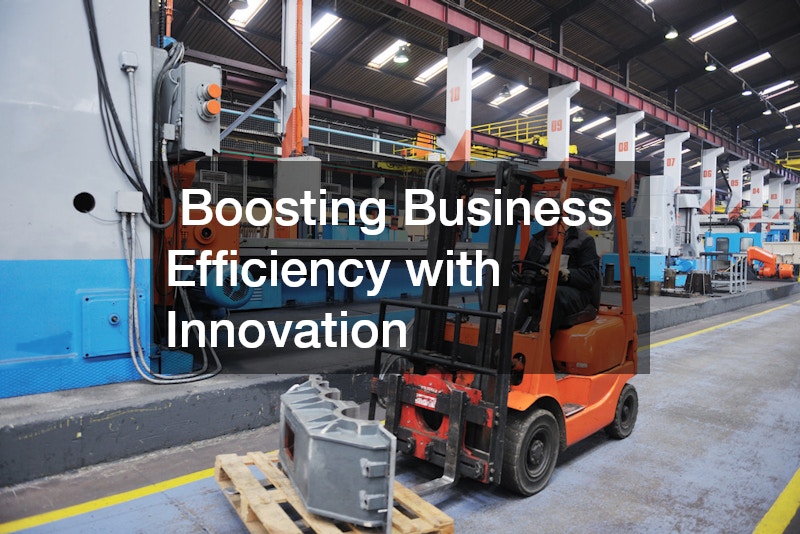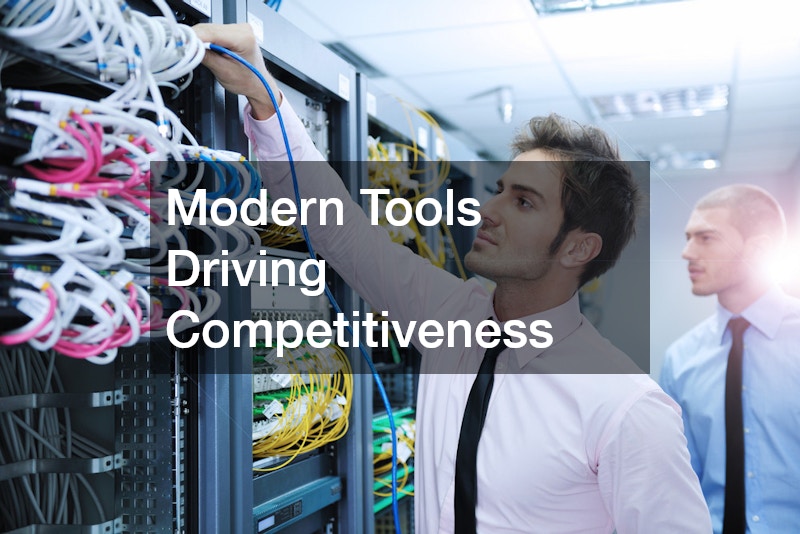In today’s fast-paced and competitive marketplace, industries across all sectors are leveraging the power of innovation to enhance operational efficiency, elevate customer experiences, and achieve sustainable growth. Technological advancements are no longer confined to specific fields—they have permeated every corner of the business world, offering fresh solutions to long-standing challenges. Whether improving logistics, automating routine tasks, or revolutionizing customer service, innovation has become the backbone of modern business success. As companies race to outpace their competitors, the integration of smart technologies into daily operations is not just an advantage—it is a necessity.
As we delve deeper into this exploration of smart technology, we invite readers to envision the limitless possibilities that these advancements herald for businesses across all sectors. The rapid pace of innovation has not only revolutionized current operational practices but also laid the groundwork for transformative solutions that will shape the future. With continuous technological evolution, businesses can proactively address the challenges of tomorrow, staying agile in the face of shifting market dynamics, consumer preferences, and industry disruptions.
Ultimately, those that prioritize the adoption of smart technologies are better positioned to create lasting value for their customers and stakeholders. Whether through innovative customer experiences, more sustainable business practices, or improved service reliability, integrating smart solutions is the key to thriving in an increasingly competitive marketplace. As the future unfolds, businesses that commit to embracing continuous innovation will secure their place as leaders, prepared to forge paths to growth, excellence, and enduring customer satisfaction.

Boosting Business Efficiency with Innovation
The realm of heavy equipment hauling has witnessed significant transformations through smart advances. Modern technologies are optimizing logistical workflows, ensuring safer and more efficient transportation of heavy machinery. By employing advanced GPS tracking and automation, companies can meticulously monitor fleet movements, reducing fuel consumption and streamlining operations.
Furthermore, innovation in equipment such as automated loading and unloading mechanisms reduces downtime and enhances worker safety. These advancements not only bolster operational efficiency but also improve service delivery, providing clients with timely and reliable transport solutions. As a result, businesses in the heavy equipment hauling sector are experiencing improved profit margins and customer loyalty.
Beyond logistical improvements, smart advances also pave the way for data-driven decision-making. Real-time analytics offer insights into performance metrics, enabling companies to preemptively address potential issues. This proactive approach positions them favorably against competitors who rely on outdated methods.
Elevating Customer Experience with Tech
Auto repair companies are adopting cutting-edge technologies to enhance their service offerings. The integration of diagnostic software allows technicians to identify vehicle issues more swiftly and accurately than ever before. As smart advances continue to evolve, these systems are becoming indispensable tools in modern repair shops.
Incorporating digital platforms for scheduling and customer communication further elevates the client experience. Customers can easily book services online, receive updates on repair progress, and access maintenance histories with ease. Such conveniences foster strong relationships between repair centers and clients, promoting ongoing business.
Moreover, the advent of mobile apps allows auto repair companies to offer personalized recommendations based on service histories, enhancing customer satisfaction and trust. These technological enhancements not only streamline operations but also position businesses as leaders in providing superior automotive care.
Streamlining Operations Through Advances
The gutter installation company sector is no stranger to innovation, utilizing smart advances to refine their processes. Automation in material cutting and installation has drastically reduced manual labor, improving efficiency while maintaining high-quality standards. This technology ensures precision and consistency across projects.
Additionally, the deployment of drones for site surveys facilitates rapid and accurate assessments, enabling precise estimations and planning. These aerial views provide comprehensive insights that guide installation teams in optimizing resources and timelines. Such innovations lead to reduced project costs and heightened customer satisfaction.
By adopting digital project management tools, gutter installation companies can monitor progress in real time, enhancing coordination among crew members. This seamless integration of technology results in timely project delivery and fosters trust with clients, thereby elevating the industry’s standard.

Modern Tools Driving Competitiveness
Commercial HVAC services are leveraging smart advances to deliver exceptional performance in heating, ventilation, and air conditioning systems. The use of IoT-enabled devices permits ongoing monitoring and remote management, allowing technicians to address issues proactively before they escalate.
Smart thermostats and energy-efficient systems further optimize temperature regulation, contributing to significant energy savings for clients. Such technologies not only enhance operational sustainability but also appeal to environmentally conscious consumers. This green approach differentiates service providers in a competitive market.
Furthermore, by harnessing analytics from IoT data, commercial HVAC services can offer predictive maintenance that extends the lifespan of equipment. Clients benefit from reduced downtime and unforeseen repair costs, strengthening client-provider relationships and ensuring repeat business.
Revolutionizing Service-Based Industries
Shower door services have embraced technology to revolutionize customer experience and operational procedures. With smart advances, companies are implementing design software that enables clients to visualize products before installation. This visualization ensures that customer expectations align perfectly with the final result.
Additionally, automated measuring tools ensure precision in custom fitments, reducing waste and installation time. Streamlined processes lead to increased project efficiency and client satisfaction as shower door services meet tight deadlines effectively.
As augmented reality gains traction, service providers can offer virtual showroom experiences from the comfort of the client’s home. This immersive technology enhances decision-making and establishes the company as a cutting-edge leader in personalized solutions.
Maximizing Profits with Smarter Processes
In the residential roofing company arena, smart advances are streamlining project management and execution. The use of drones for roof inspections allows for detailed assessments without the need for extensive manual labor. This not only speeds up the evaluation process but also enhances accuracy in estimations.
Furthermore, the incorporation of roofing management software organizes project timelines and material logistics, optimizing resource allocation. These technological solutions minimize waste and reduce operational costs, thereby maximizing profit margins for roofing companies.
Augmented reality simulations grant clients a preview of the finished work, aiding in material and design choices. This interactive engagement enhances customer satisfaction, setting residential roofing companies apart in a competitive industry landscape.

Sustainable Growth with Smart Solutions
For the brake repair service industry, smart advances have catalyzed service improvement and customer safety. Advanced diagnostic tools and equipment enable swift identification and resolution of braking issues, ensuring that vehicles meet safety standards promptly.
Integrating technology platforms for service scheduling and customer follow-ups enhances convenience and engagement, encouraging repeat business. Additionally, maintenance reminders via mobile notifications keep clients proactive about vehicle care, improving safety and satisfaction.
Data analytics empower businesses to anticipate service trends, adjust inventory accordingly, and implement effective marketing strategies. These insights foster sustainable growth in the brake repair service sector while elevating operational efficiency.
Empowering Teams with Technology
Wheel refinishing services are capitalizing on smart advances to refine their offerings and improve operational workflows. The use of automated color matching and application technologies ensures flawless finishes and reduces the potential for human error during refinishing.
Furthermore, digital platforms for order scheduling and client communications streamline engagements, facilitating a seamless customer journey from inquiry to service completion. This dedication to technological integration boosts market reputation and client satisfaction.
By embracing virtual training tools for workforce development, wheel refinishing service businesses enhance skillsets and productivity, empowering teams to deliver superior quality work consistently. This investment in human capital drives long-term success and competitiveness.
Raising Industry Standards Through Innovation
In the ever-evolving sphere of commercial cleaning services, smart technological advances are reshaping operational practices, service quality, and customer expectations. One of the most significant innovations is the development and deployment of automated cleaning systems and robotics. These advanced tools are capable of performing routine cleaning tasks with high precision and consistency, such as floor scrubbing, vacuuming, and sanitizing. By reducing the need for manual labor, businesses can lower labor costs while significantly enhancing productivity. Additionally, these systems can work continuously without fatigue, ensuring that cleaning tasks are completed efficiently and on schedule. This automation not only streamlines operations but also allows employees to focus on more specialized tasks, elevating the overall quality of service.
The integration of Internet of Things (IoT) devices into commercial facilities has also revolutionized how cleaning services are monitored and managed. These smart devices can track cleaning schedules, monitor environmental factors such as air quality and humidity, and even detect when specific areas need immediate attention. By leveraging real-time data, cleaning teams can optimize their workflows to ensure that all areas are cleaned according to health and safety protocols. This data-driven approach also enhances accountability and transparency, providing customers with detailed reports and insights into the frequency and effectiveness of cleaning efforts. These assurances help foster trust, strengthen customer relationships, and promote long-term partnerships in an increasingly competitive industry.
In addition to automation and IoT integration, the adoption of eco-friendly cleaning technologies has become a crucial differentiator in the commercial cleaning market. As sustainability becomes a priority for businesses across all sectors, many cleaning service providers are transitioning to environmentally friendly solutions, such as biodegradable cleaning agents, water-saving equipment, and energy-efficient machinery. These innovations help reduce environmental impact while still maintaining high cleaning standards. Companies that position themselves as environmentally conscious leaders can appeal to eco-minded clients, demonstrating their commitment to sustainability and social responsibility.
By embracing these smart innovations, commercial cleaning businesses can stay competitive in a rapidly evolving market. Automation and robotics ensure efficiency and reliability, IoT devices offer actionable insights for improved service delivery, and sustainable cleaning technologies align with shifting consumer values. Together, these advancements not only enhance operational performance but also elevate customer experiences, setting forward-thinking businesses apart from the rest. In a world where technology and customer expectations are constantly advancing, staying ahead of the curve through smart innovations will be the key to sustained success and growth in the commercial cleaning industry.

Staying Competitive with Smart Upgrades
Roof repair services have seen significant advancements thanks to smart technology, leading to improved efficiency, higher-quality outcomes, and greater customer satisfaction. One of the most impactful innovations has been the use of drones for inspections and assessments. By deploying drones, roofers can quickly capture detailed, high-resolution images and video footage of the entire roof, enabling them to identify issues such as leaks, cracks, or damaged shingles without requiring physical access. This non-invasive approach not only speeds up the diagnosis process but also minimizes risks to workers while providing more accurate, data-driven insights for developing repair strategies.
Modern roofing materials have also evolved to meet the demands of environmentally conscious consumers. Many advanced materials are now designed to be more durable, reducing the need for frequent repairs or replacements. Additionally, some roofing solutions offer enhanced energy-saving properties, such as improved insulation and solar reflectivity, which help homeowners and businesses reduce their energy consumption and carbon footprint. These innovations allow service providers to offer value-added benefits, catering to a wide range of client needs and preferences, from sustainability-minded individuals to cost-conscious property owners.
Incorporating robust project management software has further transformed the roof repair industry. These tools enable service providers to plan, coordinate, and oversee projects with precision. By centralizing information and providing real-time updates on progress, scheduling, and resource allocation, companies can ensure that tasks are completed on time and within budget. Enhanced communication between teams and clients fosters transparency, helping to build trust and improve overall customer experiences. This level of operational excellence is crucial for maintaining a competitive edge in a crowded market.
As industries adapt to the complexities of today’s business environment, integrating smart technologies is no longer an option—it is a necessity. For example, sectors such as heavy equipment hauling and commercial cleaning have embraced innovation to streamline processes and elevate service quality. The adoption of these technologies has enhanced operational efficiency and transformed customer interactions, creating new opportunities for businesses to meet evolving client expectations.
By leveraging smart advances, businesses can better anticipate market trends, optimize services, and drive sustainable growth. Companies that remain vigilant and open to innovation position themselves as leaders in their industries, ready to adapt to future challenges and demands. The integration of smart processes and digital advancements not only strengthens customer relationships but also secures a company’s position in an increasingly competitive marketplace. Ultimately, the commitment to continuous technological evolution will be the foundation for success in service-based industries, paving the way for long-term growth and operational excellence.


